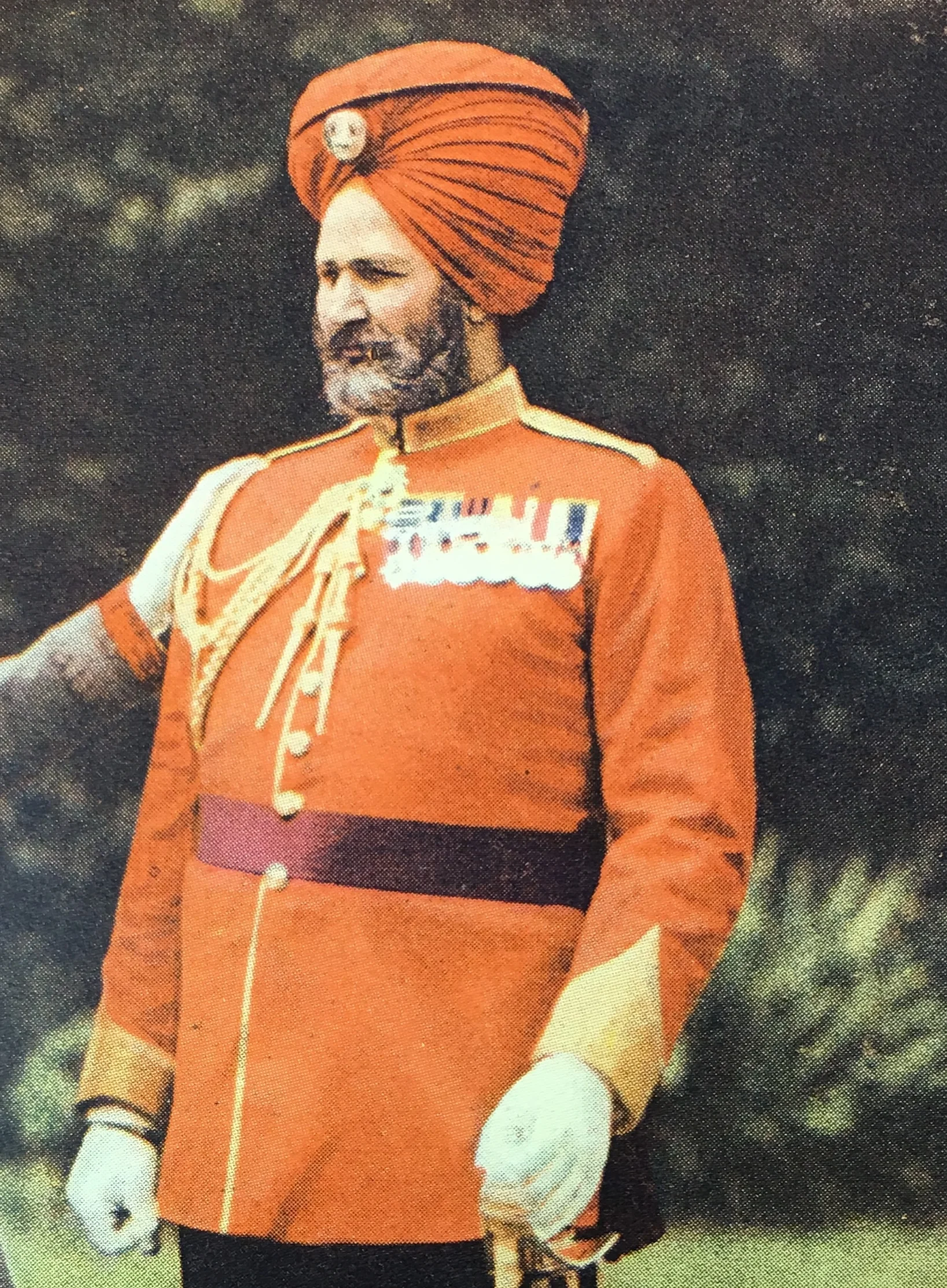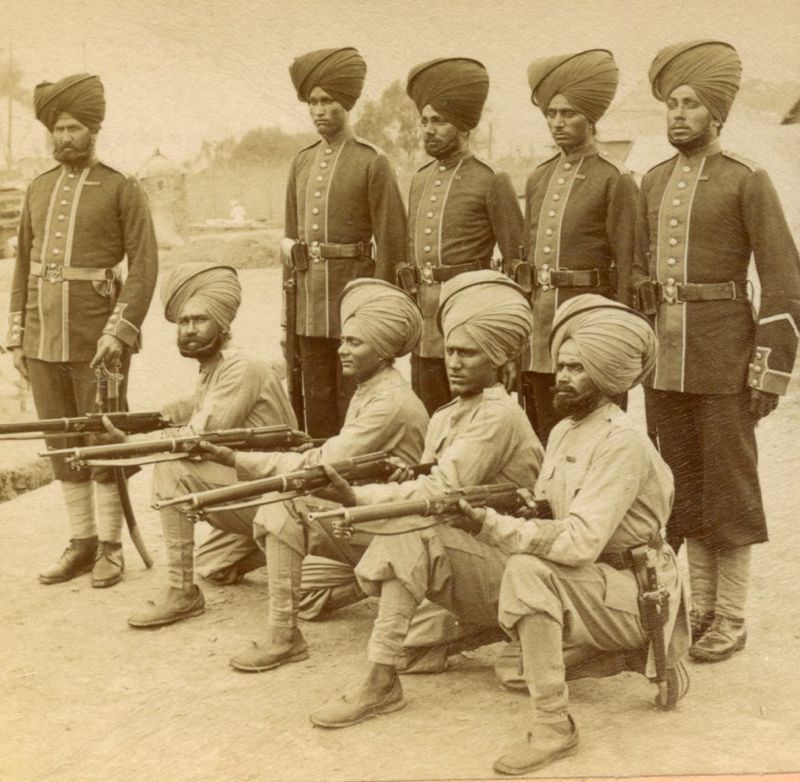A Subedar-Major in the 14th Ferozepore Sikhs who was born in the village of Budh Singh Wala in the district of Ferozepur, East Punjab. After serving in the North-West Frontier Province, East Africa and China, he retired just before the start of the Great War and was instrumental in training his men for the conflict ahead. His life has been researched by his great-great-grandson’s wife, Citizen Historian Sukhi Brar.
What We Know
1. Life Before The War
Bhagwan Singh was born in the village of Budh Singh Wala in the district of Ferozepore, East Punjab.
Bhagwan Singh joined the 14th Sikhs on 3 July 1882. On 1 July 1895 he was promoted to the junior rank of Jemadar (see Indian Army List, April 1914, p 482).
In 1888, he saw action in Hazara in the North-West Frontier of India, and in Waziristan in 1894-95.
According to a published regimental history (see Colonel F.E.G. Talbot, The 14th King George's Own Sikhs: 1846-1933, London, 1937), Bhagwan Singh was sent to British East Africa in June 1897 in a party consisting of thiry men drawn equally from the 14th and 15th Sikhs under the command of Lieutenant N.A. Macdonald. They left India for service with an expedition under the command of Lieutenant-Colonel Macdonald.
During various engagements against Sudanese mutineers and others, Bhagwan Singh was wounded but survived. He was awarded the Third Class Indian Order of Merit (IOM) 'for continuous and conspicuous gallantry in action’. This was subsequently advanced to the Second Class of the Order.
Bhagwan Singh rejoined his regiment in May 1899. In the summer of 1900, the 14th Sikhs were dispatched from India to China to join the international forces engaged in relieving the legations besieged at Peking (Beijing) and suppressing the 'Boxer' rebellion. Bhagwan Singh recieved a medal for his participation in this campaign.
He was promoted to the senior rank of Subedar on 4 September 1900 and to Subedar-Major on 16 September 1904.
On 1 January 1906, the regiment was honoured by the appointment of George, the Prince of Wales as Colonel-in-Chief and renamed the 14th Prince of Wales’ Own Ferozepore Sikhs. Bhagwan Singh and two British officers were presented to Prince George at Benares in February. Bhagwan Singh was later decorated with the medal of the Royal Victorian Order.
When George V came to throne in 1910, the regiment changed its name once again to become the 14th King George's Own Ferozepore Sikhs.
In May 1911, Bhagwan Singh and Jemadar Jaimal Singh went to England with other selected representatives of the Indian Army to attend the coronation of King George V (see images).
Early in 1913, the 14th Sikhs were stationed at Peshawar. Soon after their arrival, Bhagwan Singh was selected as one of the four Indian Orderlies to the King for that year and spent the early summer months in England (see images).
By this point, he had 31 years’ service with the regiment and had contributed greatly to the training, morale and discipline of the men under him. He retired and was succeeded by Subedar-Major Lal Singh on 4 July 1914, just a month before the onset of the Great War.
2. Life During The War
Records show that Bhagwan Singh came out of retirement and was re-employed on 24 June 1915.
This may have been to temporarily support the regiment, which was virtually wiped out at the Third Battle of Krithia on 4 June 1915.
In what was to be the most deadly encounter in the regiment’s history, it lost 379 men out of 514, and 80% of its officers as they fought their way through enemy defences at Gully Ravine during the Gallipoli campaign.
Despite having lost three-quarters of its strength in a single day, the 14th Sikhs took three lines of trenches and managed to hold them throughout the day. In the carnage, Bhagwan Singh’s youngest son, Sepoy Sobha Singh, also fell. He is commemorated at the Helles Memorial in Turkey. His wife never remarried and she passed away in 1979.
3. Life After The War
Bhagwan had two sons, Lakha Singh and Sobha Singh, and one daughter who died when just a baby.
Lakha Singh, had four sons, Balwant Singh, Atma Singh, Shamsheer Singh (Sukhi Brar’s husband’s grandfather) and Ram Singh, and two daughters, Jaswant Kaur and Balwant Kaur.
Sukhi Brar’s aunt (her husband’s father’s sister) told her that the older generation of men in the family were all spiritually inclined and had a spot in a nearby field where they meditated. The Tibi Sahib Gurdwara exists in their ancestral village, Budh Singh Wala, to mark this place.
ADDITIONAL INFORMATION
Bhagwan Singh’s family surname was Brar.
He was awarded the Order of British India (OBI), First Class.
The OBI was an order of merit awarded for distinguished service on a particular campaign, but was also often awarded to officers for between 20 and 30 years service. The recipients of the First Class were entitled to the title 'Sardar Bahadur' (heroic leader).
He was awarded 100 acres of land in modern-day Pakistan in recognition of his service and made an Honorary Captain.
OTHER LINKS
- Regimental histories: 14th Ferozepore Sikhs
- Bhagwan Singh's son: Sepoy Sobha Singh
UPDATES
There are no updates at present.
CAN YOU HELP?
Contact us today if you can help us...
- locate his medals
- understand how his family coped during the war
- find any other information about this soldier







